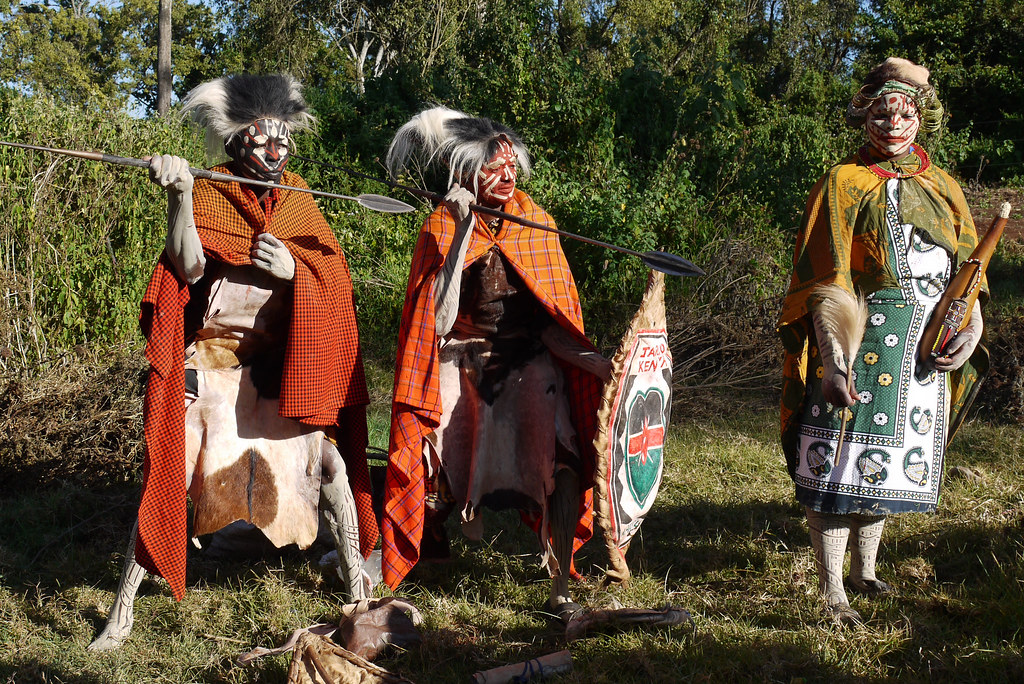The Kikuyu people are one of the largest ethnic groups in Kenya, with a rich cultural heritage and a complex system of beliefs and rituals that have been passed down through generations. Central to their worldview is a monotheistic belief in a supreme deity known as Ngai or Mwene-Nyaga, who is associated with the sacred Mount Kenya, or Kirinyaga, which is seen as the throne of Ngai. The Kikuyu's religious and mythological framework is deeply interconnected with their social structure, agricultural practices, and the natural world, reflecting a harmonious relationship between the community and its environment.

Deity and the Spiritual Hierarchy
Ngai (Mwene-Nyaga): Ngai is the creator and provider, omnipresent and manifest in the sun, rain, and fertility of the land. He is believed to reside on Mount Kenya, and it is to him that the Kikuyu pray for blessings, rain, and guidance. The mountain is not only a physical representation of Ngai's abode but also a symbol of the spiritual connection between the deity and the people. Rituals and sacrifices are often performed facing Mount Kenya, reinforcing the spiritual bond and seeking favor.
Mythology and Rituals
The mythology of the Kikuyu is rich with stories that explain the origins of the world, the creation of humanity, and the establishment of social and moral orders. One key myth is the story of Gikuyu and Mumbi, the first parents from whom all Kikuyu clans are descended. According to legend, Ngai created Gikuyu and then provided him with a wife, Mumbi. Together, they had nine (or ten, with the tenth often remaining unmentioned due to traditional taboos) daughters, who became the matriarchs of the Kikuyu clans. This myth underscores the importance of family, community, and the divine sanction of social structures within Kikuyu society.
Rituals play a crucial role in Kikuyu society, marking important life stages such as birth, initiation, marriage, and death. These ceremonies are not only social events but also carry deep spiritual significance, reinforcing the community's bond with Ngai. Among the most significant rituals is the initiation ceremony, which marks the transition of boys and girls into adulthood, equipping them with the knowledge and responsibilities of adult members of the society.
Unique Beliefs and Practices
Mugumo Trees (Fig Trees): The Kikuyu hold the Mugumo tree in high regard, considering it sacred and a dwelling place for spirits. Rituals and offerings are often made at these trees, which serve as a conduit between the physical and spiritual worlds. The cutting down or the natural fall of a Mugumo tree is an event of significant spiritual portent, often requiring rituals to appease the spirits.
Divination and Healing: The Kikuyu have a deep tradition of divination and healing, with medicine men and diviners playing a crucial role in diagnosing illnesses, predicting future events, and offering solutions to community problems. These practices underscore a belief in the interconnectedness of the physical and spiritual realms and the importance of maintaining harmony within the community and with the natural world.
Ancestor Worship: While the worship and reverence of Ngai are central, the Kikuyu also believe in the presence and influence of ancestors' spirits in their daily lives. Ancestors are respected and honored through rituals and offerings, with the belief that they can provide guidance, protection, and intercession with Ngai on behalf of the living.

The Kikuyu culture's beliefs, mythology, and rituals are a testament to the community's rich spiritual heritage and its understanding of the interconnectedness of life, the environment, and the cosmos. The reverence for Ngai, the sacredness of Mount Kenya, the mythological origins of the clans, and the importance of rituals and ceremonies in marking life's milestones all contribute to a complex and harmonious worldview that continues to influence the Kikuyu people in both traditional and modern contexts.